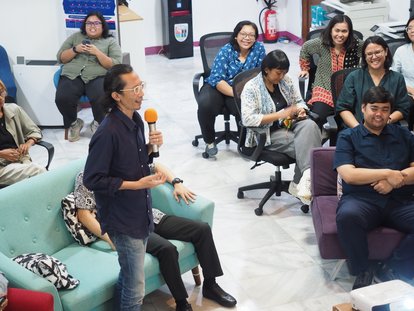Press Release
What’s next after the Germans election?

FNF Indonesia held a partner gathering and discussion on February 24th, 2025, focusing on the results of the German election and its global implications. The event was attended FNF Indonesia partners, including the Center for Indonesian Policy Studies (CIPS), the Journalists Association for Diversity (SEJUK), the Institute for Democracy and Prosperity (INDEKS), and representatives from the Bureau of Cooperation at the Ministry of Human Rights and the Bureau of Cooperation at the Ministry of Law.
The Political Landscape of Germany
The discussion was moderated by Ganes Woro Retnani, an FNF Indonesia program officer, with Dr. Stefan Diederich, FNF Indonesia Project Director, as the main speaker. Dr. Diederich’s presentation provided an in-depth look into Germany’s electoral history and the significance of the 2025 election results. The results of Germany’s 2025 federal election have brought major shifts to the country’s political scene. The conservative CDU/CSU, led by Friedrich Merz, came out on top with 28.5% of the vote, putting him in a strong position to become the next Chancellor.
The German parliament has undergone significant changes over the years. The 5% electoral threshold determines parliamentary representation. Previously, the Bundestag had 733 seats, and the latest election results indicate changes that will shape Germany’s governance structure since it will only has 630 seats.
The political landscape is further influenced by external factors, such as the ongoing Ukraine war and financial burdens on Germany. Alternative für Deutschland (AfD) has gained significant traction, especially in East Germany. Social media platforms like TikTok have played a role in mobilizing voters, particularly among younger demographics.
Germany’s economic challenges, particularly in light of rising inflation and energy crises, were also discussed. The country’s role in the European Union and its response to geopolitical shifts, such as the U.S. election and global economic instability, will play a key role in determining future policies.

Germany-Indonesia Relations
For Indonesia, Germany’s election outcomes may not drastically shift democratic cooperation but will continue to shape trade, humanitarian efforts, academia, and science collaborations. While democratic perspectives may differ, the economic and diplomatic ties between the two nations remain significant.
Germany remains a key trading partner for Indonesia, with collaborations in manufacturing, technology, and education. The discussion also highlighted the importance of strengthening bilateral relations amid changing global dynamics. With both countries facing economic challenges, the potential for increased cooperation in sustainable development, climate change initiatives, and digital transformation was emphasized.
During the Q&A session, participants raised thought-provoking questions about various aspects of the election. Ahmad Junaidi from Sejuk asked why the AfD has a strong presence in East Germany. Dr. Diederich explained that the region has distinct traditions, a unique city structure, and a history of economic struggles, all of which contribute to AfD’s dominance. He also pointed out that social media platforms like TikTok have played a significant role in shaping voter preferences in the area.
Meanwhile, Anton Rizky from CIPS questioned whether coalitions formed by ideologically different parties could maintain stability. Dr. Diederich acknowledged that smaller coalitions are generally more manageable than extreme political alliances. He also noted that coalition governments could enhance policy-making, serving as a model for other countries observing Germany’s governance system
Additional discussions touched on how foreign investors view Germany’s political climate and whether shifts in governance may impact business regulations. Participants also explored how Germany’s stance on foreign policy, particularly in Asia, might evolve under the new government.

Conclusion
The event concluded with a discussion on the global challenges facing Germany, including economic instability, war support, with shifting political dynamics and international challenges, Germany’s election results will continue to influence not only Europe but also its partners, including Indonesia.
Participants agreed that while democratic institutions in Germany remain strong, the political landscape is evolving in ways that will have long-term effects on governance, international alliances, and economic policies. The ongoing need for cooperation between Germany and Indonesia in various sectors remains a priority, particularly in trade, education, and sustainable development.
FNF Indonesia remains committed to fostering democratic dialogue and collaboration, ensuring ongoing discussions on global political trends and their impact on Indonesia’s democratic development.

